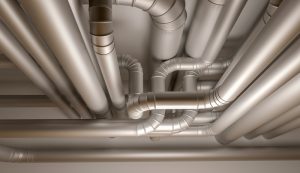When it comes to commercial heating in Warner Robins, GA, choosing the right system is critical for energy efficiency, comfort, and long-term cost savings. We understand the unique needs of businesses and commercial facilities, and we’re here to help you explore the best heating options available. Whether you’re constructing a new building or upgrading an outdated system, here are some of the most effective commercial heating solutions to consider.
1. Furnaces
Commercial furnaces are a popular heating option, especially in colder climates. They operate by heating air and distributing it through ductwork via a blower system. Furnaces can run on natural gas, electricity, or oil, making them versatile for different commercial applications.
Pros:
- High efficiency, particularly with modern gas-powered units
- Quick heating capabilities
- Long lifespan with proper maintenance
Cons:
- Requires ductwork, which may not be ideal for some buildings
- Higher initial installation cost compared to other heating solutions
2. Boilers
Boilers are a tried-and-true heating solution for commercial buildings, especially large facilities. They work by heating water and using either steam or hot water to provide warmth through radiators, baseboard heaters, or radiant floor heating systems.
Pros:
- Efficient for large buildings with multiple zones
- Provides consistent and even heating
- Can be integrated with industrial processes
Cons:
- More expensive to install compared to forced-air systems
- Requires regular maintenance to prevent scale buildup and corrosion
3. Heat Pumps
Heat pumps are becoming increasingly popular for commercial applications due to their energy efficiency and ability to provide both heating and cooling. These systems transfer heat rather than generating it, making them a cost-effective solution in moderate climates.
Pros:
- Lower operating costs compared to traditional heating systems
- Can provide both heating and cooling, eliminating the need for separate systems
- Environmentally friendly with reduced carbon emissions
Cons:
- Less effective in extremely cold temperatures unless paired with a supplemental heat source
- Higher upfront cost compared to traditional furnaces
4. Radiant Heating Systems
Radiant heating is an excellent option for facilities that require consistent warmth without the need for forced air. These systems use heated water or electric coils beneath floors or in walls to distribute heat evenly.
Pros:
- Provides even heating without drafts
- Energy-efficient as it reduces heat loss through ductwork
- Ideal for spaces like warehouses, garages, and gymnasiums
Cons:
- High installation costs, especially for retrofits
- Slower heating response time compared to forced-air systems
5. Rooftop Units (RTUs)
Rooftop units are self-contained heating and cooling systems commonly used in commercial buildings. They are installed on the roof and provide conditioned air through ductwork, making them an efficient option for large spaces.
Pros:
- Space-saving design by keeping equipment off the ground
- Easy to maintain and service due to accessible placement
- Suitable for various commercial applications
Cons:
- Exposure to weather conditions may impact longevity
- Installation can be complex and costly
6. Ductless Mini-Split Systems
For smaller commercial spaces or buildings that lack existing ductwork, ductless mini-split systems offer a flexible and energy-efficient solution. These systems consist of an outdoor compressor and indoor air handlers that provide zoned heating.
Pros:
- Ideal for zoned heating and cooling
- Highly energy-efficient with minimal heat loss
- Easy installation without extensive ductwork
Cons:
- Not suitable for large buildings requiring centralized heating
- Initial costs may be higher than traditional systems for larger installations
If you’re considering a new commercial heating installation or need expert advice on upgrading your existing system, contact Premier today. Our experienced team will assess your needs and recommend the best heating option for your business.


